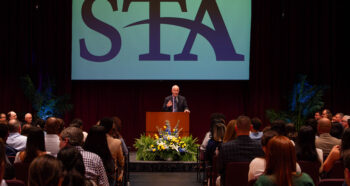Three Cambridge IGCSE™ students from SpInS Interactional School, Indonesia have won the Sustainability Award in the Cambridge Upper Secondary Science Competition. The competition gives students the chance to connect science to real-world problems.
Students Luna Chai, Colleen Sheridan Sutrisno and Gisela Nixie Valerie Lie undertook research into creating sustainable packaging from two different parts of a corn plant – corn husk and corn stalk pith. Their investigation found that corn husk paper was the clear winner due to its strength, density and water resistance. We asked the students and their principal about the project.
What inspired you to focus on sustainable packaging?
Luna: ‘Deforestation is a major recurring threat to Indonesia. Naturally, the first factor we could think of was paper. By diving deeper into our research, we found packaging paper to be a suitable topic of interest.’
Indonesia is home to a third of the world’s rainforests. According to its government’s latest available data, the country recorded 104,000 hectares (256,990 acres) of deforested area from July 2021 to June 2022, down 8.4% compared with the year prior to that.
Colleen: ‘We decided on paper from different wastes of corn as Indonesia is known for the quantity of corn produced – it felt more personal to make the research correlate with our homeland.’
Gisela: ‘I’d seen documentaries highlighting the severity of deforestation in the Amazon rainforest. This led me to become aware of Indonesia’s high deforestation rates and the implications this has on biodiversity – a tragic reality for a nation known for its astonishing scenery and abundant wildlife.’
Why is education important in tackling climate change?
Luna: ‘Education provides the basis of knowledge that allows more people to develop their ideas, innovations and individual expertise to contribute towards a more sustainable future.’
Colleen: ‘I believe that by educating people, we can raise awareness of how climate change can affect our lives, whilst also promoting different solutions.’
Gisela: ‘Education fosters a deeper understanding of underlying causes and potential solutions. It encourages people to take action by implementing sustainable alternatives and making informed decisions on what is good for the planet.’
How have your own studies helped you understand the climate crisis?
Luna: ‘Learning Cambridge IGCSE Geography and Biology opened my eyes to the science behind the climate crisis and I have been able to gain a greater understanding about this global issue. Participating in the Cambridge Upper Secondary Science Competition pushed me to further my existing knowledge and build on ideas.’
Colleen: ‘By following the geography and science syllabuses of the Cambridge curriculum, I learnt about the causes and effects of climate change. By participating in the competition, I learnt about more ways to reduce our contribution to climate change on a larger, industrial scale.’
Gisela: ‘I first became interested in climate change on encountering it in the Cambridge IGCSE Biology syllabus. The comprehensive coverage of the topic provided me with a greater understanding of the severity and impacts of climate change. This competition has given me the perfect opportunity to try to find a solution to tackle the climate crisis.’
What role do you hope to play in tackling climate change in the future?
Luna: ‘I hope to be able to have the chance to explore and discuss the topic with experts by delving into the latest discoveries and perhaps even contribute as an innovator myself.’
Colleen: ‘I plan to involve myself in more environmental research and publish this to raise awareness.’
Gisela: ‘I strive to make a significant contribution towards the fight against climate change. I hope that my research will eventually be implemented everywhere and utilised as a sustainable alternative.’
A principal’s perspective on climate change education
Principal of SpInS Interactional School, Sanjana Bhat, agrees that education plays an important part in combating climate change:
‘The Cambridge curriculum has always evolved in tandem with the requirements of a modern education. Keeping students abreast of the environment around them makes education more meaningful. For climate change, subjects like Cambridge IGCSE Geography and Global Perspectives, combined with the Cambridge Upper Secondary Science Competition, lifted the morale and the awareness of students. Their continued efforts will help redefine the world that future generations will inherit.’
Find out more about the Cambridge Science competition and how your school can enter





